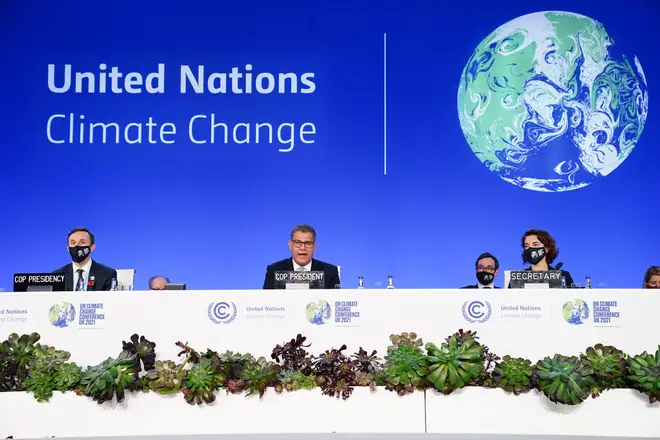
Iain Dale 10am - 1pm
13 November 2021, 19:59 | Updated: 13 November 2021, 21:41

World leaders have agreed a deal to get countries to strengthen their emissions-cutting targets for 2030 by the end of next year in a bid to limit dangerous global warming.
The new global climate deal was agreed at COP26 on Saturday evening - more than 24 hours after the official finishing time of the conference.
The deal will accelerate efforts toward phasing down unabated coal and phasing out inefficient fossil fuel subsidies.
The Glasgow Pact was watered down at the last minute - following a push by India and China - from escalating the "phase out" of unabated coal, to "phase down", prompting angry responses from European and vulnerable countries.
Read more: 'I am part of her movement': PM's COP26 adviser Mark Carney hails Greta Thunberg

What is COP26?
But it is the first explicit mentions of fossil fuels in a UN climate agreement.
The deal aims to keep limiting global warming to 1.5C above pre-industrial levels "alive" or within reach, in the face of a huge gap between the action countries are taking and what is needed to meet the goal.
After the decisions were agreed, COP26 President Alok Sharma told the climate summit "history has been made here in Glasgow".
He said: "We can say with credibility that we have kept 1.5C within reach but its pulse is weak and it will only survive if we keep our promises, if we translate commitments into rapid action and if we deliver on the expectations set out in this Glasgow Climate Pact to increase ambition to 2030 and beyond."
He said the "vast gap that remains" must be closed and quoted remarks from the Prime Minister of Barbados, Mia Mottley, who earlier told the conference that for Barbados and other small island states a rise of 2C is a "death sentence".
Read more: COP26 'doubles carbon footprint' of previous climate summit
Read more: Boris Johnson took private plane back to London from COP26 climate summit
Boris Johnson, who has been embroiled in a Tory "sleaze" row in recent days, also welcomed the pact.
"We asked nations to come together for our planet at COP26, and they have answered that call," he said.
"I want to thank the leaders, negotiators and campaigners who made this pact happen - and the people of Glasgow who welcomed them with open arms.
"I also want particularly to thank COP President Alok Sharma who has worked incredibly hard to bring countries together.
"There is still a huge amount more to do in the coming years. But today’s agreement is a big step forward and, critically, we have the first ever international agreement to phase down coal and a roadmap to limit global warming to 1.5 degrees.
"I hope that we will look back on COP26 in Glasgow as the beginning of the end of climate change, and I will continue to work tirelessly towards that goal."
But the deal has faced criticism for not being strong enough to tackle the crisis.
London mayor Sadiq Khan said the agreement "simply doesn't meet the scale of the challenge" - and said t is "vital" we give our world its "best chance of survival".
"The climate crisis is the biggest challenge facing our world and it is clear that we cannot afford further delay," said Mr Khan.
"Countries on the front line of the climate crisis deserve to have the urgent issue of loss and damage addressed and there is much still to be done to keep the hope of 1.5C alive.
"So, as leaders return home from Cop26, it is vital those nations who have it in their power to help reverse our planet's decline join those of us committed to doing so to give our world its best chance of survival."
At an afternoon plenary on Friday, countries set out their views on the latest drafts of the agreements, which had been published earlier in the day.
Two major issues of concern were financial support for poorer countries in efforts to adapt to climate change and the phasing out of "unabated coal and subsidies for inefficient fossil fuels".
The draft appeared to have weakened its push to curb fossil fuels, instead focusing on "rapidly scaling up clean power".
There were also warnings that limiting temperature rises to 1.5C - a deal set in place as part of the Paris Agreement - was a "matter of life and death".
Scientists have said that global emissions need to be reduced by 45 per cent by 2030, reaching net zero by 2050.
The Mayor of London Sadiq Khan said: "The climate crisis is the biggest challenge facing our world and it is clear that we cannot afford further delay.
"While I welcome any progress, this agreement simply doesn't meet the scale of the challenge.
"Countries on the front line of the climate crisis deserve to have the urgent issue of loss and damage addressed and there is much still to be done to keep the hope of 1.5C alive.
"So, as leaders return home from Cop26, it is vital those nations who have it in their power to help reverse our planet's decline join those of us committed to doing so to give our world its best chance of survival."
This story is being updated